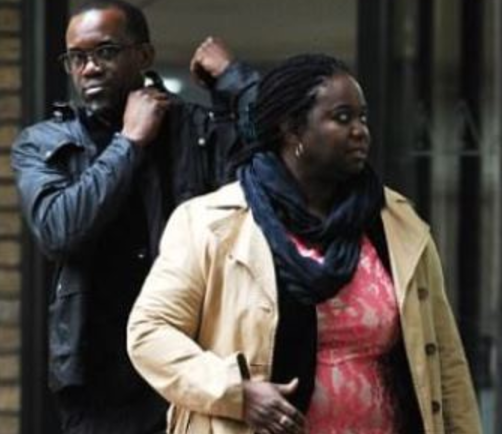A Nigerian medical Doctor, Dr Ayodeji Adewakun, 44, and her husband Abimbola Adewakun, 48, have been accused of trafficking a Nigerian woman to the UK before making her work 18-hour shifts and beating her when she asked for higher wages.
The couple were also alleged to have paid babysitter Iyambo Olatunji “just £20’’ a week for looking after their two young children at home in Erith, south east London.
Olatunji, 37, told Southwark Crown Court that she was also made to work long arduous days cleaning their house before staying late and cooking the couple dinner.
She claims that when she asked for higher wages, she was slapped by Mr and Mrs Adewakun.
Olatunji, who did not have her own bank account, was originally promised a 450 pounds monthly salary over a 15-month period, jurors heard.
The Adewakuns’ first met her back in her home town of Ondo State where she was working as a secretary for the local government in return for N40,000.
After spending time working for Mr Adewakun’s pastor father as a teen ‘house-helper’ in the 1990s, she was invited to make the trip to London to work as a babysitter for the pair.
Olatunji told the court Ayodeji, or ‘Aunty Ayo’, ‘said she would look after me’.
‘She said I would be fine,’ Ms Olatunji continued.
‘She said she would pay me money, a salary. The salary would have been higher than the one I was earning in the local government.’
The Kent-based doctor promised her new childminder 450 pounds per month in a contract signed by the couple and Olatunji which also set out a range of terms and conditions of her employment which began when she arrived in February 2004.
They included caring for couple’s two young children ‘at times agreed in advance’ during working hours ‘stipulated as Monday to Saturday’ six days per week between 7am and 5pm.
Olatunji denied she was made aware of any duties expected of her outside of her babysitting role and added that she had never even had a bank account set up for her to receive her wages into.
‘I told Aunty Ayo ‘I do not have one’ but she just said ‘I have plans for you’,’ she added.
She said Ayodeji’s brother accompanied her to the British Embassy in Nigeria to get her passport and held onto it until they landed in the UK.
When she first arrived at the three-bedroom house she met the couple’s Hungarian au pair who showed her the children’s nursery, school and local park before leaving a week later with ‘a bad attitude’.
Jurors heard Dr Adewakun spotted Ms Olatunji chatting to the au pair and raged ‘Are you listening to her? She is not happy you are here because she is leaving.
‘She is not a good au pair.’
The court heard Olatunji, who came to the UK with just five naira in her pocket, was not even treated to a t-shirt she liked during a family holiday to Euro Disney.
On their return, she claimed she was made to get up at 6am to get the children fed and off to school before tidying the home during the day and preparing meals for the evening.
‘I am not sleeping at 8pm or 9pm – it is midnight,’ said Ms Olatunji.
She recalled that the doctor and her husband sometimes did not return home from work until well after 10pm.
‘Sometimes she would speak nicely to me – 25 per cent nice to me, 75 per cent anger,’ Ms Olatunji said.
‘She did not pay me.
‘Both of them did not pay me, they just gave me 20 pounds on Friday.’
She was even told a landline call to her parents back home was ‘too expensive’ and spent some of her wages on Africa Tel calling cards.
Olatunji said she was slapped three times by the doctor when she asked for more money.
The first occasion, coinciding with her birthday, was documented in a diary she kept, which also detailed the lax payment schedule.
Jurors heard the babysitter wrote: ‘Aunty fight with me today.
‘She slapped my face twice.
‘The day I will never forget in my life – the first time in history that somebody has slapped my face.’
Olatunji claimed she was assaulted again twice before she reported her situation to Mrs Adewakun’s mother.
Dr Adewakun and her husband Abimbola, both deny obtaining services by deception and trafficking a person into the UK for exploitation.
Mrs Adewakun further denies assaulting Olatunji and two further counts of fraud and trafficking a person into the UK for exploitation in relation to a second victim.
The trial continues.
NAN

